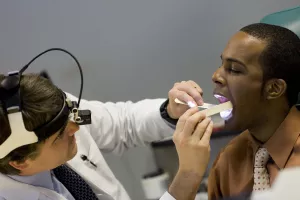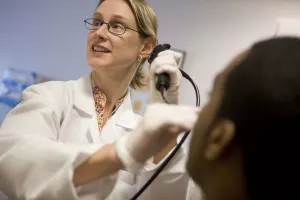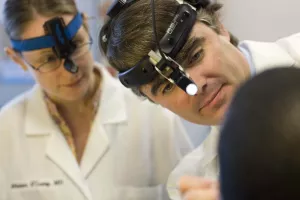Whether you're a professional singer or just enjoy singing in the shower, it's important to take care of your voice to express yourself. At Tufts Medicine, we use cutting-edge technology and compassionate care to treat voice, upper airway and swallowing issues.
Reclaim your voice
It can be challenging to live with voice, swallowing or airway disorders, but treatment can help. These disorders can make engaging in activities you love more difficult, such as chatting with friends, singing a melody or enjoying your favorite meal. We recognize the impact these issues have on your overall health and emotional and professional well-being. From an opera professional to a karaoke star and everyone in between, we're here to support your healing and health.
If you're experiencing persistent symptoms like difficulty breathing, a weak or breathy voice, a constant need to clear your throat or a feeling that something is stuck in your throat, know that Tufts Medicine is here with support and expertise to help you understand and treat your voice, upper airway and swallowing issues.

Conditions
We provide a helping hand to people living with the following voice and swallowing conditions:

Back behind the microphone
Singing, performing and careers with high voice demands bring joy to many. When you're having trouble with your voice, it can be stressful and keep you from doing what you love. We are fellowship-trained voice and singing specialists (meaning we did extra training in this area), so let's harmonize to get you sounding your best.
Testing
Depending on your needs, we have cutting-edge technology to test your baseline and measure your progress:
- Laryngeal electromyography
- Videolaryngoscopy
- Videostroboscopy
Treatments
Your treatment team includes a fellowship-trained laryngologist and a voice-specialized speech pathologist who is also a singing voice specialist that work together to get your voice back. We also collaborate with specialists across Tufts Medicine in physical therapy, gastroenterology, pulmonology and neurology to address any factors that impact your voice health. To rehabilitate your voice, we may recommend medications, therapy, in-office procedures or surgery, but your treatment plan will be completely customized to you and may include:
- Botox injections
- Laser procedures
- Steroid injections for subglottic stenosis (airway narrowing)
- Vocal fold injection
- Laryngoplasty for paralysis or atrophy
- Voice therapy
- Singing voice therapy
- Vocal stamina and conditioning
- SPEAK OUT! voice therapy
If surgery is needed, we offer some of the latest techniques, like operative microlaryngeal phonosurgery, laryngeal framework surgery, and in-office procedures like vocal fold injections and laser procedures. Rest assured, our team of experts has years of experience caring for patients with voice and swallowing disorders.
FAQs
At your first visit, patients with voice, upper airway, and swallowing complaints will meet with both our laryngologist and voice-specialized speech pathologist. During this appointment, we will discuss your symptoms and conduct a thorough evaluation of your condition. This evaluation may also include a video laryngoscopy or videostroboscopy, which allows us to looks at your vocal folds and assess their health and function. Our team will then engage in a discussion with you about your treatment goals and provide recommendations. Together, we will collaboratively devise a personalized treatment plan tailored to address your specific needs and concerns.
Common signs of a voice problem include:
- A change in the sound of your voice
- Pain, discomfort or effort while speaking
- Regularly losing your voice
- Your voice gets tired more easily
- Others having difficulty hearing your voice
If you have been experiencing difficulty with your voice for 4+ weeks, it's recommended that you schedule an appointment. However, if you are a professional voice user or concerned about your voice, you can definitely be seen sooner.
Voice therapy is a specialized treatment designed to help people improve their voices and prevent future problems. It typically involves learning vocal exercises, developing strategies to improve daily vocal health habits and practicing speaking voice techniques to reduce vocal strain or fatigue.
Not at all! Anyone and everyone can receive voice care.
Yes, our team includes a ENT doctor who is a laryngologist and voice-specialized speech pathologist who is also a singing voice specialist. They have extensive training and experience treating singers.


From regular office visits to inpatient stays, find the healthcare you need and deserve close to home.

Meet the doctors and care team devoted to supporting you every step of the way along your path to better health.